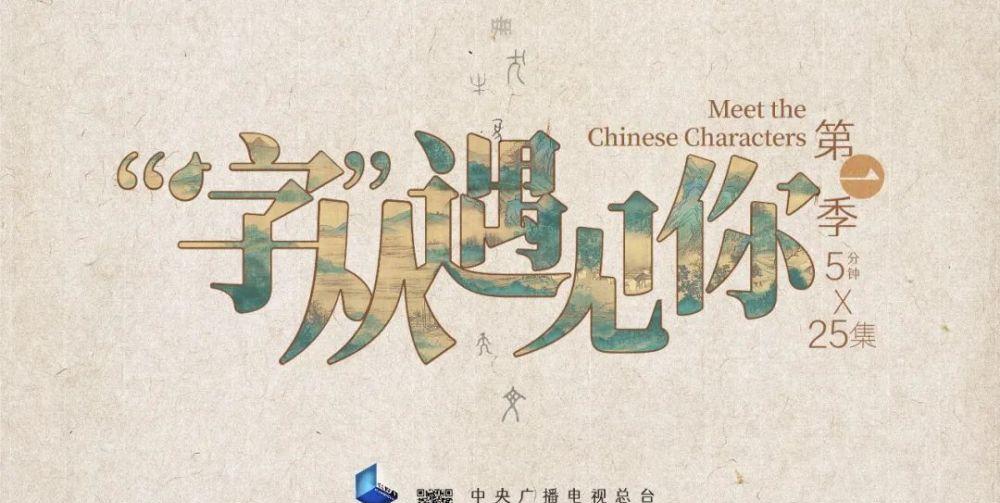Liu An's Huainan zi benjing of the Western Han Dynasty: "In the past, Cangjie wrote books, but the rain and millet and the ghosts cried at night."
You can see the magic of Chinese characters.
The documentary "Characters" from Meeting You is a documentary series that spies on the ancient Chinese cultural code from small Chinese characters.
Through the relaxed and pleasant unveiling of the character-making scenes precipitated in the depths of history, the film allows the audience to obtain hard-core knowledge of script archaeology and be influenced by the beauty of classical Chinese culture.

Orthography
Figurative thinking in ancient China
As the beginning of a Series of Chinese Character Documentaries, "Characters" From Meeting You aired the first 5 episodes during the Qingming Festival.
One episode and one episode tells about five Chinese characters, namely "Zhong, Ding, Bu, Tian, and Fu".
These five Chinese characters are a few words of origin meaning in the Chinese character world.
The documentary meticulously traces the original form of each word and its meaning to the audience.
The ancestors of the characters had a revered imagination, and they used simple painting to summarize, describe and combine the ancient landscape scenes to make their expressions desirable.
This is very different from the use of letter combinations to express meaning in pinyin, and the purpose is very different.
The documentary "Characters" from Meeting You tells us that Chinese characters have a strong cultural interest, profound situational wisdom and cute figurative thinking.
The words are clean
The cosmology and philosophy of life in Chinese characters
Chinese characters are born from the figurative scene and give birth to the Chinese ancestors' views on life, life, wealth, time and space, and even the universe.
The documentary "The Word" From Meeting You" says that the "heaven" of a person with a huge frame is the cosmic impression formed by the Chinese ancestors when they faced the sky.
The ancients asked "Is there anyone in heaven", and the exclamation "Oh my God" when people exclaimed in later generations, are interpreting the cosmology of the creator:
God, the infinite space above human beings' heads, is supreme and rules over everything in the world.
The word "Zhong" originally represented "banner", meaning concentration and convergence, and later represented "the center of the world".
The meaning of the word "zhong", "not east, not west, not south, not north", was later extended and became the key to Chinese's life in the world:
"Impartial, just right".
This is the "moderation" philosophy of traditional Chinese culture.
"Heaven" refers to heaven, and "medium" refers to earth.
"Heaven" and "Medium" constitute the cosmic concept and geographical positioning of the ancient Chinese for heaven and earth.
"Fuku" is derived from the artifacts of sake brewing.
The documentary says: "If someone's family not only has enough rice to eat, but also has leftovers to make wine, isn't that happiness what it is?" ”
This is the most tangible view of wealth in ancient China.
Cultural code
Ancestor information and collective unconsciousness in Chinese characters
The documentary tells the audience that many Chinese characters use specific objects or scenes as the blueprint for creating characters.
These scenes are separately subordinate to life, production, entertainment, sacrifice, war, or political situations.
The documentary "The Word" from Meeting You" said that "Zhong" was once closely related to major political occasions, especially battlefield battles, and from a "blessing", it can be seen that the ancestors have mastered the life skills of winemaking.
"The aroma of wine comes from a mysterious blessing, so the first bowl of wine must be sacrificed to the flame, and according to legend, the height of the flame is the manifestation of the god's return, and the aroma of the wine is high, and it is therefore blessed."
This is a particularly mysterious cultural revelation.
The word "Ding" reveals the strong cultural color of sacrifice in ancient China.
The etymological meaning of "Bu" reveals the Chinese ancestors' love of divination.
The film says, "During the Yin Shang period, from the princes and nobles to the people of Li, the three most important things in daily life were eating, sleeping, and fortune telling."
The ancestral information of ancient China contained in the source of Chinese characters reveals the cultural anthropological code of the ancient Chinese people.
It can also be seen from this that there are many collective unconsciouses that have been precipitated in traditional culture from ancient times to the present.
What is valuable is that "Characters" from Meeting You interprets the meaning and story of the etymology with a rather youthful approach to storytelling.
Witty and ridiculous, beautiful and witty, side-by-side quotations.
In these square Chinese characters, the Chinese ancestors embody the observations, thoughts, inductions, reasoning and conjectures of the chinese ancestors on the external world.
And holographically integrated into the ancestors of the human world, the universe and the future world of the romantic feelings and magnificent imagination.
The sky is long
Chinese characters are permanent
……
Commentator Chen Liqiang